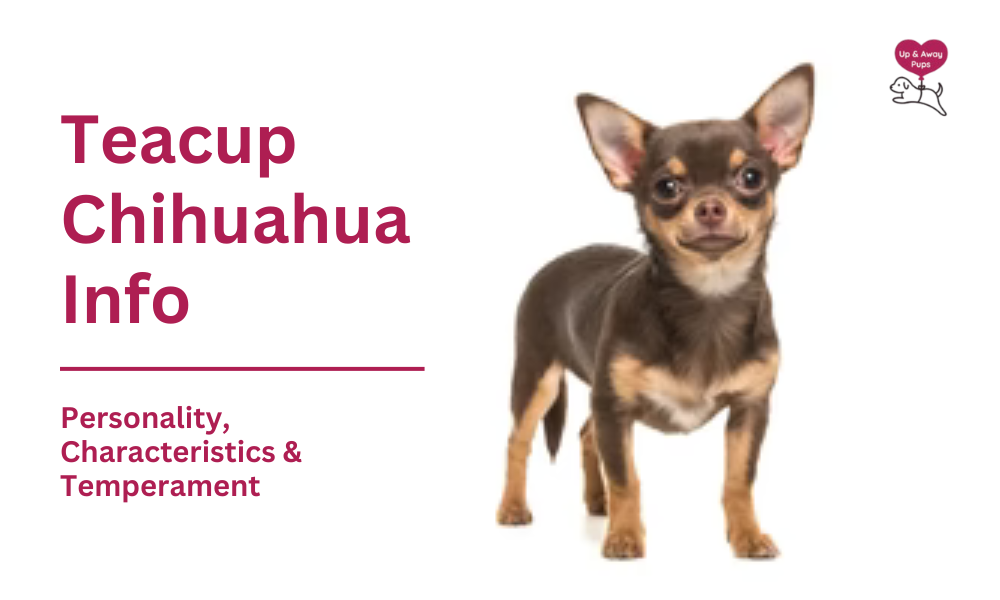Teacup Chihuahua Info: Personality, Characteristics & Temperament
Tiny but bursting with personality, the teacup Chihuahua is a bold and loving companion that thrives on attention and a calm environment. Though not a separate breed, this miniature version of the Chihuahua is known for its loyalty, sass, and intelligence. They’re perfect for apartment living but require special care due to their delicate size and health sensitivities. With proper training, early socialization, and a gentle home, teacup Chihuahuas can live happy, fulfilling lives. Just be ready for a big personality in a tiny package!
Tiny but confident, that’s the teacup Chihuahua in a nutshell. They may be small enough to sit in your hand, but they come packed with attitude and heart. If you're considering adding one of these little firecrackers to your life, it helps to understand how they behave, what they need, and what makes them tick.
Let’s take a closer look at what defines the personality, characteristics, and temperament of the teacup Chihuahua.
What Exactly Is a Teacup Chihuahua?
A teacup Chihuahua isn't a separate breed. It's a nickname for an especially small version of the standard Chihuahua. Most weigh under 4 pounds and stand less than 6 inches tall.
Their features are familiar to any Chihuahua lover. Big round eyes, upright ears, and a sleek or fluffy coat. They come in a variety of colors. You'll find both apple-head and deer-head shapes, just like standard Chihuahuas.
These dogs are bred specifically for size. That means they're often the smallest in the litter, and sometimes that small size comes with health compromises. More on that shortly.
Teacup Chihuahua Personality
If you’ve ever been around a Chihuahua, you already know that these dogs are extremely bold and full of personality. Jokingly, it is often said that they have the small dog syndrome; they often forget how small they are whilst picking fights or barking at dogs or people 10 times their size. They just want to be noticed.
These dogs bond deeply with their person. They want to be near you, curled up in your lap. Whilst they can be social dogs, they do take a little time warming up to new dogs. Some are shy, others will bark at anyone new. It depends on how they were socialized as puppies.
One minute they’re cuddly, the next they’re barking at a shadow. That’s part of the charm.
How They Learn and Think
Teacup Chihuahuas are smart little dogs that catch on quickly when it comes to patterns, rewards, and routines. Training them can be enjoyable, but it also requires patience. Whilst they can be sassy and aren’t always eager to please you like breeds like the Cavapoo or Miniature Bernedoodle, they learn. Gentle persistence works better than firm discipline. Positive reinforcement, short sessions, and food rewards go a long way.
They are alert and watchful, which translates to a yapper. So, you want to ideally socialize them early on so they don’t overreact to sounds, movements and strangers.
Teacup Chihuahua Characteristics
Because of their size, teacup Chihuahuas need special care. Their bones are more delicate. A small jump from the couch could lead to an injury. It’s easy to forget, but what looks minor to us is a big fall to them.
They can also suffer from low blood sugar. Skipping meals or missing a snack can make them shaky or tired. Some even pass out if not treated. Feeding them small, frequent meals helps prevent that.
Cold weather is also a challenge. These dogs get cold fast. A sweater or soft blanket helps, especially during winter walks or chilly nights.
Despite these challenges, many live full and happy lives when given proper attention and care.
Teacup Chihuahua Temperament
They may be tiny, but their personality takes up the whole room. Loyal, curious, and often dramatic, these dogs act like they’re ten times their size.
They’re often very attached to their humans. Some don’t like being left alone for long, and that can lead to anxiety or barking. They're best suited for someone who’s home often or can bring them along.
Teacup Chihuahuas aren’t usually great with young children. Their small size makes them vulnerable to being accidentally hurt. Calm households are a better match. With older kids, respectful pets, and a steady routine, they can thrive.
Great for Apartments, Not Great for Chaos
These little dogs do just fine in apartments. They don’t need a backyard or long walks. A few play sessions indoors, a stroll around the block, and they’re good.
But they don’t do well in chaotic homes. Loud noises, rough play, or being left alone all day can be too much. They want a safe, predictable space and a lap to settle into.
Teacup vs Standard Chihuahua
Both types share the same attitude and charm. But there are a few differences worth noting.
Teacups are smaller and more fragile. They’re more prone to health problems. Teacup Chihuahua Life Expectancy can also be shorter, sometimes only 7 to 12 years, compared to 14 or more for a standard Chihuahua.
Because of their rarity, teacups can also cost more. And their vet bills may be higher due to the additional health monitoring they require.
Temperament-wise, they’re quite similar. But training, socialisation, and early experiences shape each dog individually.
Final Thought
The teacup Chihuahua may be small, but don’t let the size fool you. Their personality fills every inch of the room. They’re smart, loving, and often hilarious. But they’re not low-maintenance. These dogs need gentle handling, a stable routine, and lots of attention.
If you're someone who can offer time, patience, and a safe home, this tiny dog might just be the perfect match. Just don’t expect them to act small. They never got the memo.
FAQs
Do Teacup Chihuahuas Need a Lot of Exercise?
No. They’re tiny, and short bursts of activity are usually enough. A few minutes of indoor play, a short walk, or a toy to chase will do the trick.
Can Teacup Chihuahuas Be Left Alone During the Day?
It’s not ideal. These dogs love company and often struggle with separation. If you’re away for long hours, they might become anxious or destructive. A dog sitter or companion animal can help.
Are They Hard to Potty Train?
They can be a bit tricky. Their tiny bladders mean they need frequent potty breaks. Consistency, routine, and indoor pads can make it easier. Patience is key.


